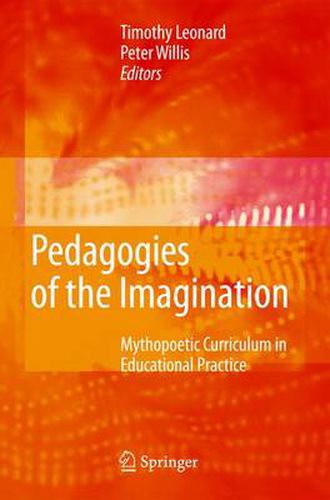Readings Newsletter
Become a Readings Member to make your shopping experience even easier.
Sign in or sign up for free!
You’re not far away from qualifying for FREE standard shipping within Australia
You’ve qualified for FREE standard shipping within Australia
The cart is loading…






This title is printed to order. This book may have been self-published. If so, we cannot guarantee the quality of the content. In the main most books will have gone through the editing process however some may not. We therefore suggest that you be aware of this before ordering this book. If in doubt check either the author or publisher’s details as we are unable to accept any returns unless they are faulty. Please contact us if you have any questions.
I have long admired the mythopoetic tradition in curriculum studies. That admiration followed from my experience as a high-school teacher of English in a wealthy suburb of New York City at the end of the 1960s. A dream job-I taught four classes of 15-20 students during a nine-period day-in a dream suburb (where I could afford to reside only by taking a room in a retired teacher’s house), many of these often Ivy-League-bound students had everything but meaningful lives. This middle-class, Midwestern young teacher was flabbergasted. In one sense, my academic life has been devoted to understanding that searing experience. Matters of meaning seemed paramount in the curriculum field to which Paul Klohr introduced me at Ohio State. Klohr assigned me the work of curriculum theorists such as James B. Macdonald. Like Timothy Leonard (who also studied with Klohr at Ohio State) and Peter Willis, Macdonald (1995) understood that school reform was part of a broader cultural and political crisis in which meaning is but one casualty. In the mythopoetic tradition in curriculum studies, scholars labor to understand this crisis and the conditions for the reconstruction of me- ing in our time, in our schools.
$9.00 standard shipping within Australia
FREE standard shipping within Australia for orders over $100.00
Express & International shipping calculated at checkout
This title is printed to order. This book may have been self-published. If so, we cannot guarantee the quality of the content. In the main most books will have gone through the editing process however some may not. We therefore suggest that you be aware of this before ordering this book. If in doubt check either the author or publisher’s details as we are unable to accept any returns unless they are faulty. Please contact us if you have any questions.
I have long admired the mythopoetic tradition in curriculum studies. That admiration followed from my experience as a high-school teacher of English in a wealthy suburb of New York City at the end of the 1960s. A dream job-I taught four classes of 15-20 students during a nine-period day-in a dream suburb (where I could afford to reside only by taking a room in a retired teacher’s house), many of these often Ivy-League-bound students had everything but meaningful lives. This middle-class, Midwestern young teacher was flabbergasted. In one sense, my academic life has been devoted to understanding that searing experience. Matters of meaning seemed paramount in the curriculum field to which Paul Klohr introduced me at Ohio State. Klohr assigned me the work of curriculum theorists such as James B. Macdonald. Like Timothy Leonard (who also studied with Klohr at Ohio State) and Peter Willis, Macdonald (1995) understood that school reform was part of a broader cultural and political crisis in which meaning is but one casualty. In the mythopoetic tradition in curriculum studies, scholars labor to understand this crisis and the conditions for the reconstruction of me- ing in our time, in our schools.